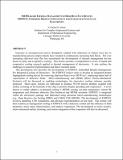| dc.description.abstract | Increases in microprocessor power dissipation coupled with reductions in feature sizes due to
manufacturing process improvements have resulted in continuously increasing heat fluxes. The ever
increasing chip-level heat flux has necessitated the development of thermal management devices
based on spray and evaporative cooling. This lecture presents a comprehensive review of liquid and
evaporative cooling research applied to thermal management of electronics. It also outlines the
challenges to practical implementation and future research needs.
This presentation also describes the development of EDIFICE: Embedded Droplet Impingement
For Integrated Cooling of Electronics. The EDIFICE project seeks to develop an integrated droplet
impingement cooling device for removing chip heat fluxes over 100 W/cm2, employing latent heat of
vaporization of dielectric fluids. Micro-manufacturing and MEMS (Micro Electro-Mechanical
Systems) will be discussed as enabling technologies for innovative cooling schemes recently
proposed. Micro-spray nozzles are fabricated to produce 50-100 micron droplets coupled with
surface texturing on the backside of the chip to promote droplet spreading and evaporation. A novel
feature to enable adaptive on-demand cooling is MEMS sensing (on-chip temperature, remote IR
temperature and ultrasonic dielectric film thickness) and MEMS actuation. EDIFICE is integrated
within the electronics package and fabricated using advanced micro-manufacturing technologies
(e.g., Deep Reactive Ion Etching (DRIE) and CMOS CMU-MEMS). The development of EDIFICE
involves modeling, CFD simulations, and physical experimentation on test beds. This lecture will
then examine jet impingement cooling of EDIFICE with a dielectric coolant and the influence of fluid
properties, micro spray characteristics, and surface evaporation. The development of micro nozzles,
micro-structured surface texturing, and system integration of the evaporator will also be discussed. | en |
